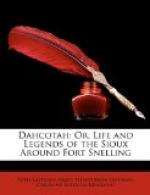Four years had now passed since Chaske left his native village, and nothing had ever been heard of him. But at length the wanderer returned.
But who would have recognized, in the crest-fallen, melancholy-looking Indian, the gay warrior that had left home but a few years before? The little boy that held his hand was cheerful enough, and seemed to recognize acquaintances, instead of looking for the first time on the faces of his father’s friends.
How did the young girls laugh when he told of the desertion of his first wife; but when he continued his story, and told them of the faithlessness of the bear woman also, you heard nothing but shouts of derision. Was it not a triumph for the Dahcotah women? How had he scorned them before he went away!—Did he not say that women were only dogs, or worse than dogs?
But there was one among his old acquaintances who would not join in the laughter. As she looked on the care-worn countenance of the warrior, she would fain have offered to put new mocassins upon his feet, and bring him food. But she dared not subject herself to the ridicule of her companions—though as night came on, she sought him when there was no one to heed her.
“Chaske,” she called—and the Dahcotah turned hastily towards her, attracted by the kindness of her voice—“there are no women who love as the Dahcotah women. I would have gone to the ends of the earth with you, but you despised me. You have come back, and are laughed at. Care has broken your spirit, or you would not submit to the sneers of your old friends, and the contempt of those who once feared you. I will be your wife, and, mingling again in the feasts and customs of your race, you will soon be the bold and fearless warrior that you were when you left us.”
And her words were true; for the Indians soon learned that they were not at liberty to talk to Chaske of his wanderings. He never spoke of his former wives, except to compare them with his present, who was as faithful and obedient as they were false and troublesome. “And he. found,” says Chequered Cloud, “that there was no land like the Dahcotah’s, no river like the Father of waters, and no happiness like that of following the deer across the open prairies, or of listening, in the long summer days, to the wisdom of the medicine men.”
And she who had loved him in his youth, and wept for him in his absence, now lies by his side—for Chaske has taken another long journey. Death has touched him, but not lightly, and pointed to the path which leads to the Land of Spirits—and he did not go alone; for her life closed with and together their spirits watch over the mortal frames that they once tenanted.
“Look at the white woman’s life,” said Chequered Cloud, as she concluded the story of Chaske, “and then at the Dahcotah’s. You sleep on a soft bed, while the Dahcotah woman lays her head upon the ground, with only her blanket for a covering; when you are hungry you eat, but for days has the Dahcotah woman wanted for food, and there was none to give it. Your children are happy, and fear nothing; ours have crouched in the earth at night, when the whoop and yell of the Chippeways sent terror to their young hearts, and trembling to their tender limbs.




